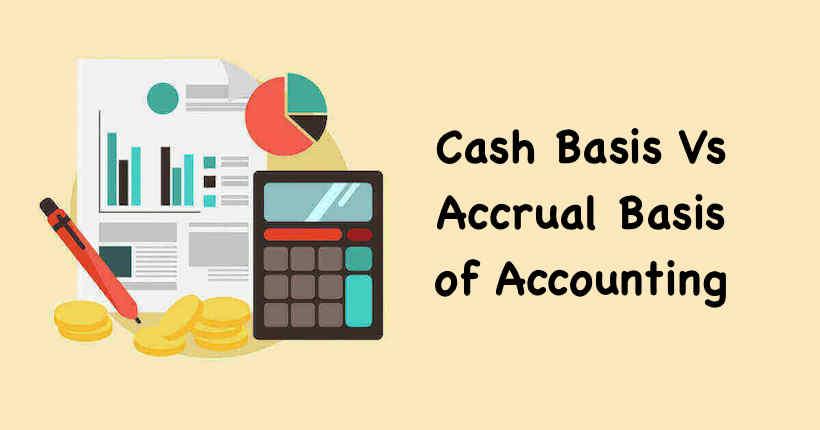Cash Basis Vs Accrual Basis of Accounting, We all have heard about the cash basis & accrual basis of Accounting, but here we will do a detailed analysis of these two forms of Accounting. We will study about what these two forms of Accounting are, what are the differences between them & when & where are these generally followed. Difference between Cash Basis and Accrual Basis of Accounting. Now you can scroll scroll down below n check more details regarding Cash Basis Vs Accrual Basis of Accounting
Cash Basis Vs Accrual Basis of Accounting
Let us start with understanding what these two forms of Accounting are:
1. Accrual basis of accounting:
- In most of the places, we find that The Accrual Basis of Accounting is the more commonly followed Accounting System.
- Accrual Basis of Accounting is a method of recording transactions by which revenue, costs, assets and liabilities are reflected in the accounts for the period in which they accrue.
- This basis includes consideration relating to deferrals, allocations, depreciation and amortization.
- This basis is also referred to as the mercantile basis of accounting.
- Under The Companies Act 2013, all the companies are required to maintain their books of accounts according to the accrual basis of accounting.
2. Cash basis of accounting:
- There are certain entities which account income & expense in the period in which there is an actual inflow or outflow of funds & not when the right to receive or pay the same arises. Such an entity is said to follow the Cash System of Accounting.
- Cash Basis of Accounting is a method of recording transactions by which revenues, costs, assets and liabilities are reflected in the accounts for the period in which actual receipts or actual payments are made.
Must Read – Accounting Entries for Service Tax, VAT and TDS
What is the difference between these two systems?
Here is a list of various differences between the two forms:
| Particulars | Accrual Basis of Accounting | Cash Basis of Accounting |
| When to be Accounted? | Under this system, when the right to receive a particular income is established or the duty to pay for a particular expense is certain, it is accounted in the period for which they relate. | Even if the income or the expense do not relate to the current period, still they can be provided for on Receipt/ Payment Basis. |
| Recognition under the Companies Act, 2013 | This basis is recognized under the Companies Act, 2013. | This basis is not recognized under the Companies Act, 2013. |
| Income & Expense Treatment in the Books of Accounts | Under this, there may be prepaid/ outstanding expenses and accrued/ unaccrued incomes in the Balance Sheet. | Under this, there is no prepaid/outstanding expenses or accrued/ unaccrued incomes |
| Higher/lower Income in case of prepaid expenses and accrued income | Income Statement will show a relatively higher income | Income Statement will show lower income. |
| Higher/lower income incase of outstanding expenses and unaccrued income | Income Statement will show a relatively lower income. | Income Statement will show higher income. |
| Profit & Loss Statement | Here, the Profit & Loss statement is generally the Income & Expenditure Account. | In this case, the Profit & Loss Statement is the Receipt & Payment Account. |
| Which form represents a true picture of the entity? | Accrual Basis is considered to be reflect a better picture of the Income & Expenditure of the entity as compared to the Cash System of Accounting. |
Recommended Articles

Using your definitions, can I do this as a sole proprietor?
Let’s assume:
* Starting assets: 9 lakh cash
* Trading 30 days/year
* Everyday of trading, 9 lakh is paid out as expenses, and 10 lakh is deposited as revenue by end of day. Thus, profit of 1 lakh per trading day.
* Tax rate: 30% flat
Under these assumptions, after 30 days of trading, my income statement and balance sheet would look like this (whether under cash basis or accrual basis):
* Revenue: 300 lakh
* Cost: 270 lakh
* Profit: 30 lakh
* Tax owed: 9 lakh
* Assets: 39 lakh cash
* Liabilities: 0 lakh
Now after 30 days of trading, on the last day of the financial year, I buy inventory worth 39. Then under cash basis my income statement looks like:
* Revenue: 300 lakh
* Cost: 309 lakh
* Profit: -9 lakh
* Tax owed: 0 lakh
But under accrual basis it remains unchanged, so I still have to pay 9 lakh as tax even though I have no cash. Whereas under cash basis, I can carry a loss of 9 lakh into my next tax return.
Now I can sell the inventory on the next day (possible in some markets), and continue business as usual.